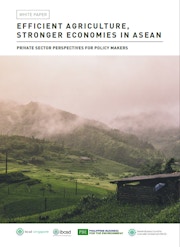
This paper aims to provide policy makers with an overview of how different organisations and sectors perceive the challenges and opportunities of sustainable agriculture in ASEAN and its contribution to strong, developing economies.
Agriculture is central to the economies of the region and provides livelihoods to a large segment of the population.
In some ASEAN countries, agriculture employs over 60 per cent of the workforce and is an essential driver for growth and poverty alleviation.
As we look to the future, it becomes obvious that to meet the goals enshrined in the ASEAN Vision 2025, it will be necessary for governments to have businesses align with these goals and actively contribute to them.
The World Business Council for Sustainable Development’s (WBCSD) Vision 2050 provides a lens to consider how businesses can grow sustainably in ASEAN and be direct contributors to the ASEAN vision and its supporting frameworks.
The early chapters in this paper provide the background and context within which agriculture and its two major shareholders – governments and businesses – operate.
As population continues to grow and ASEAN’s middle-class population further increases, demand for more food and more diverse foods will also increase, while our natural resource base is being depleted.
This means that the need for more efficient agriculture has never been greater. We also find ourselves operating in an increasingly complex environment, involving a web of different stakeholders that need to cooperate towards the common goal of sustainable agriculture.
External pressures such as climate change will also require more resilient agricultural sectors. A private sector vision of sustainable development in ASEAN is provided using the WBCSD’s Vision document, emphasising global issues like climate change which have regional implications.
Several key challenges in sustainable agriculture are subsequently explicated with policy implications in chapters which follow, namely of food security, inclusive supply chains involving smallholders, and the importance of harmonisation in crop protection regulations.
By producing this paper, the global network partners of the Business Council for Sustainable Development in Singapore, Indonesia, Vietnam and the Philippines have brought together some of the key stakeholders that have a part to play in improving the agriculture environment in ASEAN, with a special focus on smallholder farming.
Viewpoints from several business entities to share on their responses to the sustainability challenges are provided in a multi-sectioned chapter.
Throughout the course of the paper, policy makers will be provided not only with a broad overview of the challenges facing agriculture in the region and with suggestions on how best business practices and conducive policy frameworks can help address these challenges.
In addition to different industry views, the paper seeks to provide further insight into the current environment in Indonesia, the Philippines, Thailand, and Vietnam using statistical data to support policy makers in identifying areas for action.
Only by bringing together all stakeholders throughout the value chain can we hope to meet the growing demand for agricultural commodities in a sustainable way.
By bringing together different players and reviewing the current scenario, this paper points to where progress is already being made and explains how success shall continue to be realised.
Ultimately, we hope to spark dialogue and provide the support needed for ASEAN to meet the food security challenge and spur the creation of stronger economies.
Publish your content with EB Premium
It's not about how many you reach. It's about who. Get your news, events, jobs and thought leadership seen by those who matter to you.
















